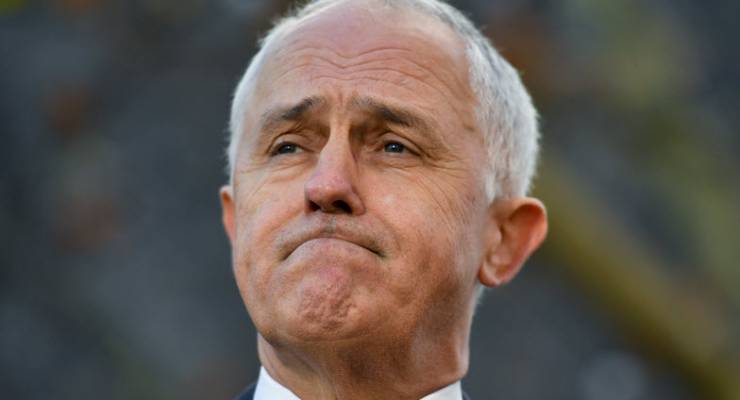
After a fallow period for federal opinion polling, in which Roy Morgan ceased its venerable series and a straitened Fairfax became more sparing with its Ipsos polls, a significant new player arrived on the scene last week.
British market research giant YouGov, in conjunction with local communications agency Fifty Acres, published the first in what will be a fortnightly series of polls on federal voting intention — and the results might have brought a small amount of cheer to the Turnbull government amid yet another difficult week.
The poll recorded a 51-49 split in favour of Labor after preferences, placing the lead well inside the margin of error.
However, certain peculiarities of the results — namely historically low primary votes for both Labor (34%) and the Coalition (33%) — will give seasoned observers cause to treat the poll with caution, given the lack of corroboration elsewhere.
Nonetheless, it should perhaps be regarded as a healthy development that not all our pollsters are singing from the same song sheet.
The many failures of polling internationally in recent years have often arisen from “herding”, whereby pollsters who find themselves out of step with their peers yield to the temptation to pull back into line by tweaking their methods.
[Poll Bludger: voters return in droves to the One Nation bandwagon]
Herding was an active ingredient in British polling’s epic failure at the 2015 election, when the Conservatives outpolled Labour by 6.4% after pollsters uniformly predicted a dead heat.
They were also mostly off the mark at last month’s election, but they took a step in the right direction by producing a much wider range of results as they experimented with different responses to the earlier failure.
Across the Channel, France’s national pollsters were patting themselves on the back after the first round vote of the presidential election on April 23, at which all seven of them landed right on the money.
But when a similarly ironclad consensus ahead of the May 7 run-off election proved to understate Emmanuel Macron’s winning margin over Marine Le Pen by around 8%, it became apparent that herding had been rampant on both occasions.
While Australian pollsters have done remarkably well at gauging national voting intention at recent federal elections, the pattern of results last year raised the suspicion that they were, like their French counterparts in April, herding to the right place — and, just like the French pollsters, they may not be so fortunate next time around.
If the best medicine for such ills is diversity in approach, our pollsters are at least passing the test when it comes to modes of surveying.
Essential Research and now YouGov conduct their polling online from panels of volunteers, while ReachTEL’s prolific “robopolling” has made the company familiar to nearly every Australian who owns a phone.
[Credlin is wrong: Tony Abbott was not more popular with women than Turnbull]
Galaxy Research, which conducts Newspoll for The Australian as well as polling under its own name for the other News Corporation papers, conducts about 60% of its polling online and the rest through robopolling of landlines, according to managing director David Briggs.
Ipsos is the last holdout for the more expensive live interview phone polling method, which generally divides 70-30 between landlines and mobile phones, according to the company’s Australian director, Jessica Elgood.
These varying methods have given rise to a few idiosyncrasies, with Ipsos generally placing the Greens solidly higher than its rivals, and Essential Research rating One Nation lower than Newspoll and ReachTEL.
But so far as the major parties are concerned, it’s a remarkable fact that the YouGov poll was only the second out of 41 polls published this year that failed to put Labor’s lead between 52-48 and 54-46 (the other being a Labor blowout in the first of the year’s two Ipsos polls).
The precise manner in which pollsters using such different survey methods keep arriving at the same place is shrouded in secrecy, as none reveals what Essential Research director Peter Lewis describes as their “special sauce”: the weightings used to match the raw data to a demographic profile of the voting population at large.
YouGov has at least made it known that its weighting categories include education and past vote, which are commonly employed in Britain but unusual in Australia, where pollsters typically weight only to age, gender and region (Newspoll/Galaxy being an acknowledged case in point).
By contrast, publication of weightings is a condition of membership of the British Polling Council and its American equivalent, the National Council for Published Polls, which also provide their respective industries with oversight and research support.
David Briggs of Galaxy Research defends the lack of an equivalent body in Australia on the basis of the local industry’s superior performance, and argues the smaller number of pollsters in Australia would struggle to provide it with the required funding.
However, it may be thought that a little more transparency would be in order given how much hangs on the results — including, in the current environment, Malcolm Turnbull’s ongoing security of tenure as prime minister.








Crikey is committed to hosting lively discussions. Help us keep the conversation useful, interesting and welcoming. We aim to publish comments quickly in the interest of promoting robust conversation, but we’re a small team and we deploy filters to protect against legal risk. Occasionally your comment may be held up while we review, but we’re working as fast as we can to keep the conversation rolling.
The Crikey comment section is members-only content. Please subscribe to leave a comment.
The Crikey comment section is members-only content. Please login to leave a comment.